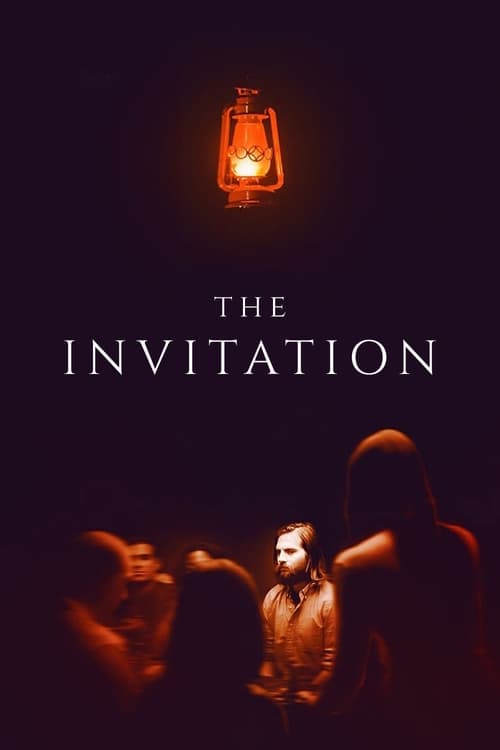
 The Invitation
— There is nothing to be afraid of.
The Invitation
— There is nothing to be afraid of.
The Invitation

Will and his new girlfriend Kira are invited to a dinner with old friends at the house of Will’s ex Eden and her new partner David. Although the evening appears to be relaxed, Will soon gets a creeping suspicion that their charming host David is up to something.





























8.6/10. Grief is a difficult emotion. On the one hand, it’s something we want to move past, because it can be debilitating, it can prevent people from living their lives and leave them mired in the tragedies of their pasts. But on the other hand, it’s something we want to carry with us, because to do otherwise means to forget the people and events in our life that shaped us, that meant something to us, even if those things were so cruelly ripped from us.
That is the essential difficulty at the heart of *The Invitation*. In a horror story with no supernatural elements, grief is the ghost that lurks in the halls of the house that provides the film’s setting. When Will and his girlfriend Kira, return to his old house for a dinner party held by Eden, his ex-wife, and her new husband, David, there is a sense memory for him being in the place where he once called home, where he and Eden and their son were once a family. He’s constantly seeing images of his son playing in the den, or washing his hand, or gazing at him from the other side of the bed. There are no real specters in *The Invitation*, but there is still the ghost of their child, haunting this place and the people who dwell within it.
But to that end, the film does a nice job at making the audience question whether there is something legitimately off about this informal reunion between Will, Eden, and the group of their friends that splintered after their son’s death, or whether the nagging doubts about the gathering are all in Will’s head, a byproduct of the pain and difficulty at revisiting a place that once held so much life and promise for him, and now is just a constant reminder of a son and a life that are long gone.
Beyond the thematic resonance of the film, it’s best feature is the mood it creates at this gathering. Director Karyn Kusama does a superb job at making this feel like a genuine yuppie dinner party, with subtle cues that something isn’t right. It’s a tough line to walk, to make this gathering of young, presumably wealthy people, feel relatable and familiar enough that their interactions and the mood of the party feels real, but that there is enough unspooling weirdness, enough disquieting little moments, whether it be a strange video from Eden and David’s retreat, or the sort of bizarre but easily written off behavior of Sadie, or a man telling the story of how he killed his wife and moved on.
What’s impressive is how long *The Invitation* let’s all of this unfold before genuinely pulling the trigger on the film’s big turn and reveal. As much as it’s steeped in the meaty thematic points, *The Invitation* is a parlor mystery at heart, and a well-constructed one at that. We get little moments between Will and almost everyone else at the party, just enough to give everyone enough of a personality, enough of a motivation, enough of a characteristic to make them feel like a part of the ecosystem being constructed. Little details that build up to the twist, like their being bars on the windows or a lack of cell reception or the front door being locked, each have plausible enough explanations that rattle Will, and by extension the audience, a little bit, but aren’t enough to definitively prove anything.
All of that building, all of that slow burning development, all of the ways in which *The Invitation* lingers with its characters, gives them each a chance to spark off one another and to let its simmering storyline froth to a boil, makes the eventual climax, where it’s revealed that Eden and David intended to poison themselves and all of their friends in an unwitting suicide pact, real power. It shines an interesting light on the ways in which Eden and David and their accomplices encouraged the other party-goers to indulge, to give into their urges, to experience bliss before their unwitting end.
But the reveal also has power in what it represents for Eden. Eden wants blindness, insulation, and escape. She, and the similarly grief-stricken David attended this retreat in order to convince themselves of the idea that death did not take their loved ones away from them, that it’s nothing to be sad about, that it’s a release and a relief and a mere delay until their reunion. By killing themselves, and their friends, they mean to wipe the slate clean, to treat these tragedies as something that can be smoothed over, that they don’t have to feel, in life or in death.
In the end, however, Eden admits the façade. She shoots herself in the stomach, symbolic of the place where she once carried her son within her, of the pain and guilt she could not outrun despite all of this effort. She admits that she misses him, that she thinks of him, and tacitly confesses that she could not deal with the pain, that this was a way for her not to have to face the horror that once made her attempt suicide in much less gilded, much less self-deluding terms. Whether it be barbiturates or new age philosophy or a gentle slip into the end, she must somehow turn away from the truth that gnaws at her, that causes her unimaginable pain.
That is the difference between Will and Eden, and the import of the film’s opening scene. When Will hits a coyote and sees it suffering, he doesn’t turn away from it or just drive off. He goes and gets a tool from the trunk and ends the creature’s suffering. It’s clear that he is affected by this, that seeing an innocent creature experiencing its last gasps of life brings him back to the moment when he saw his son in a similar position. But despite the difficulty of it, the hardship it causes him to have to take this matter into his own hands, he knows it’s what’s right; he knows that however hard it is for him, doing this mercy is better than ignoring it or pretending that it’s not there.
There’s symbolism in the film’s *Twilight Zone*-esque ending, a nicely subtle way of showing that the lessons of *The Invitation* have spread much further than Eden and David’s house. But to the extent that the film itself is filled with yuppies and new-age philosophy, in sinister terms, there’s an implicit criticism of the way of life implicated. More than one recent article (or thinkpiece) depending on your parlance has criticized the current era for its hedonism, for the tranquilizing effects of our pleasures and our technology and the other facets of modern life that insulate us from such hardships.
*The Invitation* seems to exist in the same terms. It stands for the idea that blocking out these negative emotions, giving into our shallow desires for pleasures and epicurean and carnal desires, makes us lesser as people. Even if it can give us happiness, that happiness is shallow and fleeting. Pain is real. Loss is real. Grief is real. The film acknowledges the ways in which these things can haunt us, the way they haunt Will and make him feel as though he’s been waiting to die since the moment he lost his son. But it posits that the alternative, turning away from the harder parts of our past, turning to base joys and self-delusions, is a betrayal of them, is a betrayal of the things that once made us happy, even if they can now hurt us. As hard as it is, as changed as he has become, a shaggy and quietly burning soul in contrast to the clean cut smiling dad we see in flashbacks, he chooses to do what he has to do to keep going, to make the hard choices. He chooses to live his loss, to know he may never be fully “fixed” again, to accept the pain of that, but also, to go on.